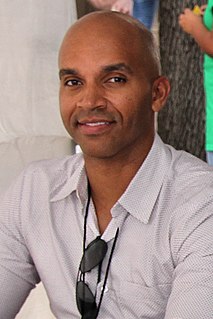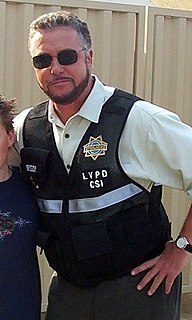A Quote by Jaggi Vasudev
Leadership is neither about you or me; it is about something that needs to be done. Leaders figure out how it can be made to happen and get ten or a million people to see that this is the way to do it.
Related Quotes
Leaders, your God-given job is not merely to preside over something, not to pontificate to your underlings how smart you are, not merely to preserve something from its gradual demise; it's to figure out what God wants to get done in this world, figure out what role you play in that, and then to move something or someone from here to there.
One of the things that's funniest about the entertainment industry and comedy is that people go 'Oh, you're great, but I don't know what to do with you.' The great thing about the Internet is that nobody has to figure out what to do with you. You can figure out what to do with you, and you can say, 'I made this thing, and I'm going to put it out, and now if people want to come see me and buy things from me they can.'
Socialism and Communism don't work, but neither does straightforward capitalism. We've got to get a new way of thinking and working. We blew it so there was good and bad about the celtic tiger. But we're tiny. There's four million in the country, do you know what I mean? We're tiny. Four million in a country, how many is in New York? Seven? Ten? But we're strong, so hopefully we pull through.
Marvin Gaye said there's a song inside of me and I can't get it out. And I know it's in there, and I can feel that it's in there, and I can't get it out. There's so much that I want to say, and I haven't been able to figure out how to say it in my art. I can only say it in ham-fisted, clumsy, nonpoetic ways, and I'm trying to figure out how to talk about life and talk about love and talk about pain and trials and tribulation in an artistic form.
As a man and as a sports figure, you have to set limits and set boundaries on what can and cannot happen. Once you do that, your family will start to respect you. 'OK, I get it, he's all about football and handling his business,' and that's what I've done. In the past, when I was a young man - a younger man - it was hard for me to say no. Since I'm older, wiser, I know how to handle people, know how to say no, know when something is right and something wrong. I use proper judgment.
I think people were a little bit too concerned about what I would or would not be allowed to say. So let me just get that out of the way and get on to the business of telling, you know, a story, or two, or three, or 15. And also to say, "Okay, look. Here it is, don't worry about it. The restrictions and the watered-down and all the stuff that you thought was gonna happen really isn't the case." So we done got that out the way, and now we can just kind of move on.
I found the place where I was beaten bloody forty years earlier and dragged to jail and that made me cry. When the family came out, that made me cry, and the reason I had a hard time leaving Grant Park was that to see a million people like that, feeling the way that million people felt, was so exhilarating.
One of the questions asked in that study was, How many Vietnamese casualties would you estimate that there were during the Vietnam war? The average response on the part of Americans today is about 100,000. The official figure is about two million. The actual figure is probably three to four million. The people who conducted the study raised an appropriate question: What would we think about German political culture if, when you asked people today how many Jews died in the Holocaust, they estimated about 300,000? What would that tell us about German political culture?
When [Bernie] Sanders was challenged about how he would pass his visionary ideas after he became president, he talked about if lawmakers look out the window and they see a million people marching, it changes their calculus. Well, here's an opportunity to continue working to organize these million people even if he is not the one in office.
But you listen to Coltrane and that's something human, something that's about elevation. It's like making love to a woman. It's about something of value, it's not just loud. It doesn't have that violent connotation to it. I wanted to be a jazz musician so bad, but I really couldn't. There was no way I could figure out to learn how to play.



































